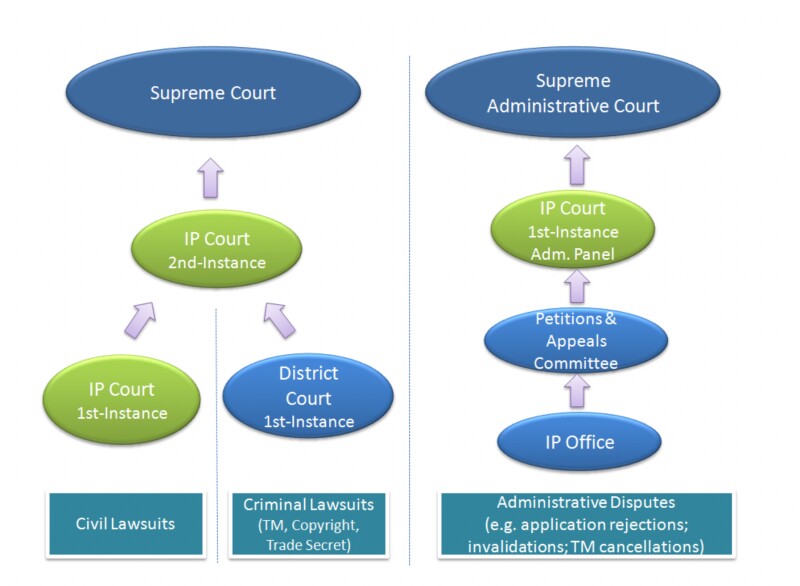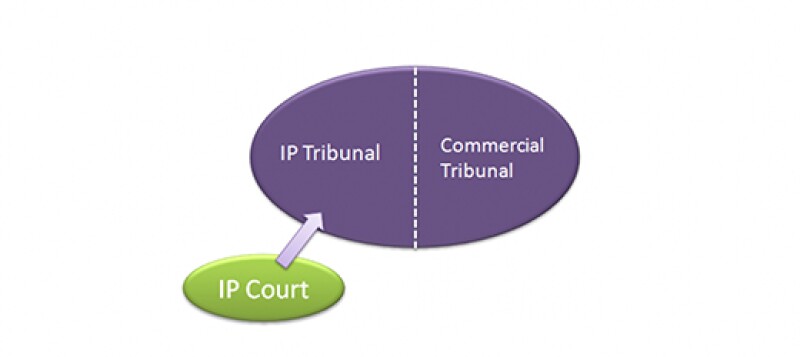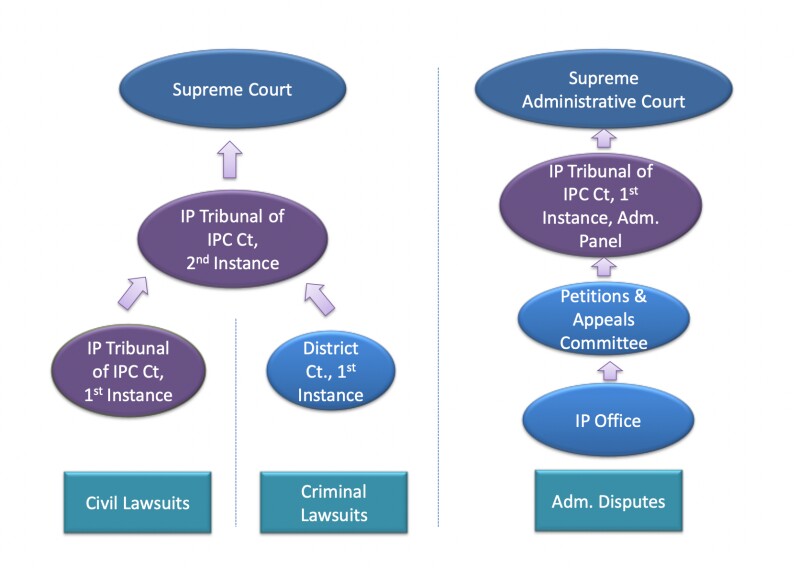On December 17 2019, Taiwan's Legislative Yuan (equivalent to a parliament in other democracies) passed a draft bill on creating an IP and Commerce Court (IPC Court) which will consolidate the IP Court which was established in 2008. The new court, estimated to come into existence in 2021, will be made up of two independent special tribunals, the IP Tribunal and the Commercial Tribunal, governed by respective adjudication rules.
The IP Court will morph into the IP Tribunal without much change other than organisational adjustments. The IP Tribunal will have the same scope of jurisdiction and instance levels as the IP Court does, and will follow the IP Case Adjudication Act which has governed IP litigation in Taiwan since 2008.
As such, theoretically speaking, just with a slight modification (as shown in the figures below), an IP lawyer's knowledge about IP litigation in Taiwan will readily fit within the blueprint for the IPC Court. Civil IP disputes will still be heard by one judge in the first instance and by a three-judge panel in the second instance, and lawyers will still find Technical Examination Officers (TEOs) assisting judges with tech issues either in the courtroom or, for example, on a defendant's premises when an evidence preservation order is executed. If litigation filings remain at the current volume, then it is very likely that the same team of IP Court judges and TEOs will just move into the new court without new members being recruited.

Fig. 1: Taiwan's current court system for IP dispute resolution

Fig.2: The IP Court will become the IP Tribunal under IPC Court

Fig. 3: Taiwan's court system for IP disputes after the IPC Court is established
The Commercial Tribunal, on the other hand, will be established from scratch and will be governed by the newly enacted Commercial Case Adjudication Act. The Commercial Tribunal will have exclusive jurisdiction over a civil commercial dispute in which "either the amount or value of the disputed claim(s) exceeds a minimum of NT$100 million, or the dispute involves a publicly traded company and affects the market order and investors' interests massively." Unlike the IP Tribunal, it does not have criminal or administrative jurisdiction, and its civil case decisions will be appealed directly to the Supreme Court. To further enhance the mutually independent nature of the two tribunals, judges at each tribunal will not hear cases falling within the jurisdiction of the other tribunal.
Despite the division, the IP community generally believes that mutual influence will occur. Some of the main features of the Commercial Case Adjudication Act are quite familiar to IP lawyers. The provision allowing the Commercial Tribunal to perform trials via a video conference (Art. 18) is obviously modelled on the counterpart in the IP Case Adjudication Act, as are the provisions regarding the issuance of confidentiality preservation orders and preliminary injunctions (Arts. 55 & 64). Very likely the IP Court's practices (as well as IP lawyers' practices) in these aspects will be adopted by the Commercial Tribunal, or at least be considered as good starting points to address these matters.
We can also assume that some of the rules in the Commercial Case Adjudication Act will be likewise applied by the IP Tribunal at least in an analogous manner. For example, expert witnesses, which some IP Court judges have wanted to admit into Taiwan's legal system, now appear in the text of the Commercial Case Adjudication Act, becoming the first exception to the long-held dichotomy of witness and court-appointed expert. A party in a commercial dispute will be allowed to call its expert witness to testify on a factual issue based on professional knowledge and experience and, more importantly, the expert witness will be cross-examined by the other party's counsel. However, whether a likewise scenario will happen in the IP Court/Tribunal is still doubtful given the strong presence of TEOs, commonly called "court experts."
Another interesting issue is that there surely will be cases over which either tribunal may exercise jurisdiction. For example, consider this scenario: if a CTO intentionally divulges his company's valuable trade secrets to a competitor, the company has both a trade secret case and a corporate law case (based on a breach of fiduciary duty claim, for instance). Under the newly amended legal framework, an infringement of trade secret claim will be tried at the IP Court/Tribunal, whilst a breach of fiduciary duty claim will be tried by the Commercial Tribunal if the claimed damages are NT$100 million or more. So which tribunal should have the priority in this case? If the tribunal where the case is first filed has the priority, then in which tribunal should the plaintiff choose to file the suit?
These questions have been pending since the IPC court was first proposed. They remain unanswered. The good news is that the IP community will have roughly two years to address such issues before the IPC Court starts to operate, possibly in 2021.

|
Tony Tung-Yang Chang |
Saint Island International Patent & Law Offices
7th Floor, No. 248, Section 3
Nanking East Road
Taipei 105-45, Taiwan, ROC
Tel: +886 2 2775 1823
Fax: +886 2 2731 6377
siiplo@mail.saint-island.com.tw











